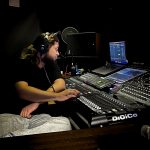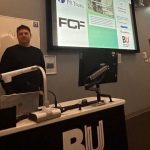 Produced by Hussein
Produced by Hussein
BA Hons Multimedia Journalism
Entering the second year of BA Hons Multimedia Journalism felt fast and strong. Our return was adjusted due to the current conditions but we were immediately thrown in the deep end of journalism with the task of news days. News days is what journalists lives are all about, everyday we come up with stories, plans, ideas and interviews to fit a certain scheduled bulletin. Just like the short 1-5 minute news stories you see on television or listen to on the radio.
The first four weeks of this year, we have set our Mondays into radio news days and Tuesdays as television news days. Our allocated groups of 15 or so people are broken up into different positions where five of us take up editorial roles whilst being on campus and everyone else is tasked to be district reporters. These reporters are the news gatherers and content feeders where the team on campus will edit, communicate, and execute the desired bulletin of that day. News gathering and content creating may sound easy to do, but the challenges we faced during those eight news days were intense but quickly expanded our abilities as journalists.
This is what a news day is like…
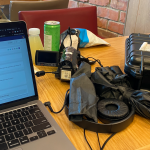
Before any news day begins, we have to come in with our ideas and prospective interviews. We have to figure out what our story is, what content we will be making, and who we need to speak to. Of course the fast paced world of journalism will also interrupt these stories with the breaking news of the day itself which requires covering! However 10am in the morning we touch base on zoom. As the output editor for one of those the day, I was tasked to figure out who was doing what story. Beside me stood the input editor that communicates with the remote reporters, our sports correspondent, our online social media liaison, our content editor, and our presenter(s). These roles have its own set of tasks, but as the team on campus we have to be vigilant in communicating with our reporters and getting their content in to be presented.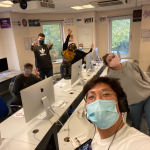
After figuring out what stories we will be having and what sort of content those stories will be presented as, the district reporters all go out and do their tasks. It starts off with some research and content gathering which includes hosting zoom calls or having in person interviews, going out into town to film/record content, editing the shots we take, and uploading it so the team on campus are able to use it and piece together the bulletin. As the editor I have to set deadlines throughout the day, therefore reporters get around 2-3 hours to create and submit their content. In radio we have a bulletin set for 12pm, 1pm, 3pm, and 4pm. These bulletins require hours of hard work and meticulous process before it is aired. The stories submitted is important to fill up that time and though each story is a small part, it plays an important role in the bigger picture.
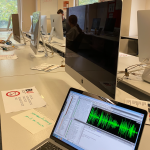 The team on campus have the important task of checking over content, keeping updates on the reporters, script writing, piecing together the presenting and of course presenting itself. Likewise, TV news days are very similar to audio news days except we have one 5-minute bulletin at 4pm and there are a few technical and editorial differences given it is a visual medium rather than an auditory one.
The team on campus have the important task of checking over content, keeping updates on the reporters, script writing, piecing together the presenting and of course presenting itself. Likewise, TV news days are very similar to audio news days except we have one 5-minute bulletin at 4pm and there are a few technical and editorial differences given it is a visual medium rather than an auditory one. 
News days can be very fun but very stressful. It is a race with and against the time mixed with the nature of ensuring all the editorial and technical elements of the pieces are in check. We are working to the second, stories cannot be one second too long or too short, neither can our presenting pace. Ensuring we have a story, our cameras, mics, laptops, editing softwares, and ability to quickly move around in town are all important to a smooth day running. Sometimes we do not have solid stories, or some stories gets thrown out, or we face technical/wifi issues but we have to keep going. Between 10-5 every Monday and Tuesday we have no clue what challenges we will face but we have to be quick on our feet to adapt and adjust.
Doing news days have quickly expanded a lot of my abilities and skills as a journalist. Nervousness of hosting interviews have decreased massively. My technical skills for filming and editing and ensuring the content looks and sounds good has improved my attention to detail tremendously. Lastly, it has further pushed me in being able to work under pressure, work better in team settings, and work to have solid communications with everyone and what is happening in the news world.
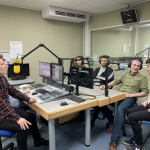 Why you should study Multimedia Journalism at BU
Why you should study Multimedia Journalism at BU New Term, New Year: Tips to consider for what’s to come.
New Term, New Year: Tips to consider for what’s to come. The beauty of international living
The beauty of international living 5 Budgeting Tips from Southeast Asian student at BU
5 Budgeting Tips from Southeast Asian student at BU





